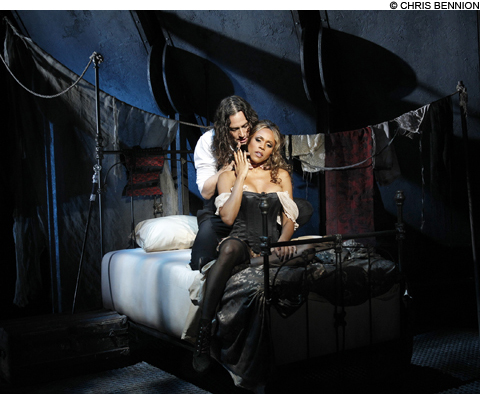
PILLOW TALK Maroulis and Cox. |
There is something to admire as well as eye-roll about melodrama, with all its inflated emotions and brake-squealing plot turns. The same can be said for the horror genre, which pumps up the terror about the existentially terrifying plight of mortality itself.
And so was born the musical version of Jekyll & Hyde, with book and lyrics by Leslie Bricusse and music by Frank Wildhorn, which is touring at the Providence Performing Arts Center (through January 6).
It's grabbing attention by starring American Idol finalist Constantine Maroulis and popular R&B singer Deborah Cox. Fortunately, Maroulis also made his reputation as a Broadway musical actor, and both are in fine voice.
The musical is based, of course, on the 1886 Robert Louis Stevenson novella Strange Case of Dr. Jekyll and Mr. Hyde, that classic allegory of our species' dual potentials of good and evil.
The show and its audiences had a long, bumpy ride between its Houston premiere in 1990, a national tour, and then four years on Broadway until 2001. Not well received at first, or even second, it has undergone major rewrites of story and music over the years, including a concert version that toured for three years. This most recent version is on its way to a limited run on Broadway once again in April.
Unfortunately, even after two decades of tweaks, enough flaws of character motivation and plot convenience remain to weaken a storyline that doesn't exactly win us over by being true to life.
Our sympathies are with the good Dr. Henry Jekyll (Maroulis) right away, when we see the good doctor singing the sad "Lost In Darkness" over his comatose father in an insane asylum. In "I Need To Know," he expresses his urgency in trying to figure out why a person can be both good and evil and how he can avoid the latter. Songs of identity abound — from the hypocrisy of posh society in "Façade" to Jekyll and his alter ego's solo duet "Transformation."
In 19th-century London, there was no hope for such a man's struggle without the encouragement of an innocent young woman. For Jekyll that is his trusting fiancée Emma (Teal Wicks), daughter of Sir Danvers Carew (Richard White). Conveniently, the amiable gentleman is chairman of the board of St. Jude's Hospital, where Dr. Jekyll has proposed testing a chemical formula that he hopes will cure lunatics of the darkness and evil that possesses them. Despite Jekyll's plaintive plea, the board rejects his proposal as blasphemous.
Apparently Jekyll's conflicted inner life is not tormenting enough for him, so he has to complicate his love life. He and his best friend, John Utterson (Laird Mackintosh), go to the red light district for his bachelor party, where Jekyll defends a prostitute who was being mistreated, Lucy Harris (Cox). Commendable and understandable. But then he proceeds to offer the stranger his calling card, telling her to see him if she ever needs a friend. Sure. And Prince Charles invites hookers to Buckingham Palace.
In earlier productions, Lucy demonstrated as complicated an inner life as Jekyll, singing "No One Knows Who I Am." But apparently all that looking within got too Dr. Phil, so now she sings an appreciative "Someone Like You."